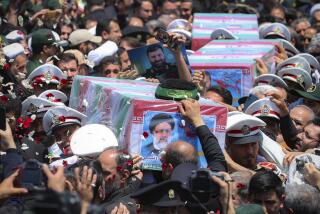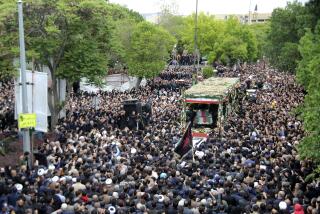A Select Few Offer Iranians Condolences
- Share via
Jack Lemmon did it, as did Gregory Peck. So did Brooke Shields and hundreds of other more ordinary Americans.
They all took the time and effort to offer condolences to relatives of the Iranian civilians killed over the July 4th weekend when a U. S. war ship shot down a commercial jetliner with 290 people aboard.
The letters, some more apologetic for and disgusted with the American action than others, all were solicited by Episcopal priest J. W. Canty III of New York.
He and his spokesmen concede that the national condolence campaign--which in three months has produced just 300 replies, four of them negative--has been controversial, what with Americans’ general dislike for Iran, a land they little understand and know only for its taking of foreign hostages and widely vented hatred of the United States.
But Canty, speaking from Moscow where he is working to spread the Alcoholics Anonymous program to the Soviet Union, said he did not solicit the condolence letters to criticize the U. S. government or place blame for the Iranian civilians’ deaths.
Rather, he likened the incident to a child’s accidental death in a car wreck, saying: “I saw this airplane accident in the same light. We as a nation had to start this process of healing and (say) that we shared in this tragedy. I think these letters hopefully are a way for that process to begin. . . .”
The program has attracted the support of Govs. Edward D. DiPrete of Rhode Island and Bob Martinez of Florida; the mayors of Dallas, Minneapolis and Washington, and seven congressmen, including Esteban E. Torres (D-Los Angeles).
Actor Peck offered a short note, which simply said: “My sincerest condolence and deepest regret to all of the relatives and friends of those innocent people who died as a result of a tragic mistake. Millions of Americans are affected by your loss, and grieve for you.”
R. G. Redens of Napa, Calif., expressed her sympathy, writing: “We too are a family, father, mother, three grown sons and a daughter and three beloved grandchildren. I and my family wish to tell your family that we weep for you, who have suffered so greatly, and we beg you not to hate us, as Americans. If there was a way we could undo this tragic circumstance, we would move mountains to do so. . . .”
‘Carried an Image’
Brynna C. Bloomfield, of Riverdale, N. Y., observed: “As a Zionist and an American, I have carried an image of the non-Jewish inhabitants of the Middle East as a ‘mass’ in which no one person is distinguishable. . . . Your losses . . . have caused me to focus my eyes on the ‘mass’ and see . . . husbands and mothers and sisters and children. Then I think you must love and despair as I do and I wonder who it is that I have been fearing.”
Other writers tried to share experiences. “The terrible tragedy which has killed your family member or members makes me sick at heart,” wrote John Comstock of Albuquerque, N. M. “My older sister was killed by a drunk driver years ago. Only after a year could my family stop thinking of it every minute. Even now we feel the hole in ourselves. I’m so sorry for the hole we have put in your families.”
Some writers criticized the U. S. government. “I see no reason for an American presence in the Persian Gulf,” wrote John E. Morby, a history professor at California State University, Hayward. “I do not share the media-projected stereotypic view of Iranians as crazed fanatics, and most of all I am appalled at the human tragedy and waste of innocent lives.”
William A. Newsom, a California Court of Appeal judge in San Francisco, agreed, writing on personal stationery: “I am deeply ashamed for America and especially for the crippling arrogance of our official responses, and for our course of self-serving prevarication.”
Shortly after the Iranian jetliner was shot down, President Reagan offered an official American apology and later said he favored compensation for victims’ families. But members of the House Armed Services Committee have demanded the government prove that any U. S. payments would reach victims’ families rather than landing in the hands of the Iranian government.
Even if that could be shown, the Administration faces a “tough sell” for victim compensation because “visceral reaction against the Iranian government runs deep,” said committee Chairman Les Aspin (D-Wis.).
Canty, concededing the controversial nature of his campaign, remains undaunted, though he has expressed surprise that Good Samaritans he has dealt with in other efforts “seemed to react differently because . . . the word ‘Iran,’ ” was connected with this cause, he said.
He said he plans to have the letters, many hand-written on lined notebook paper, translated into Farsi and 13 other languages spoken by relatives of the dead. He has received word from the Iranian mission in Washington that there would be no problem with his delivering the letters to families in Iran in mid-October.
Those who wish to send condolences may write to P. O. Box 6122, Grand Central Station, New York, N.Y. 10163-6019.
More to Read
Sign up for Essential California
The most important California stories and recommendations in your inbox every morning.
You may occasionally receive promotional content from the Los Angeles Times.













